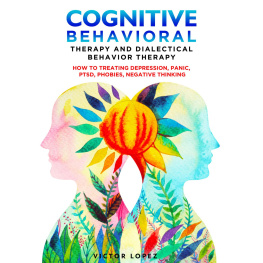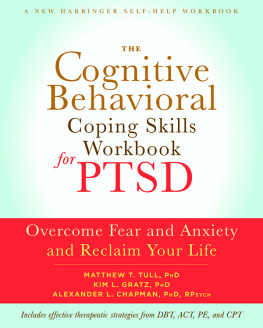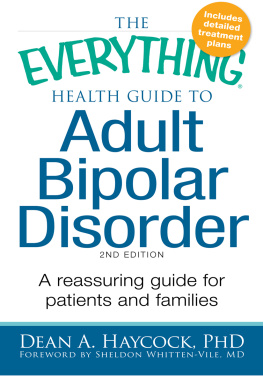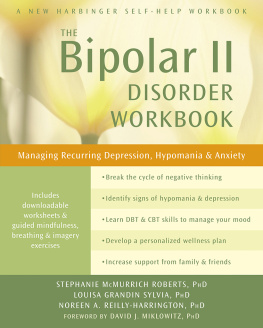Bipolar Disorder For Dummies, 2nd Edition
by Candida Fink, MD, and Joe Kraynak

Bipolar Disorder For Dummies, 2nd Edition
Published by John Wiley & Sons, Inc. 111 River St. Hoboken, NJ 07030-5774 www.wiley.com
Copyright 2013 by John Wiley & Sons, Inc., Hoboken, New Jersey
Published simultaneously in Canada
No part of this publication may be reproduced, stored in a retrieval system or transmitted in any form or by any means, electronic, mechanical, photocopying, recording, scanning or otherwise, except as permitted under Sections 107 or 108 of the 1976 United States Copyright Act, without the prior written permission of the Publisher. Requests to the Publisher for permission should be addressed to the Permissions Department, John Wiley & Sons, Inc., 111 River Street, Hoboken, NJ 07030, (201) 748-6011, fax (201) 748-6008, or online at http://www.wiley.com/go/permissions
Trademarks: Wiley, the Wiley logo, For Dummies, the Dummies Man logo, A Reference for the Rest of Us!, The Dummies Way, Dummies Daily, The Fun and Easy Way, Dummies.com, Making Everything Easier, and related trade dress are trademarks or registered trademarks of John Wiley & Sons, Inc., and/or its affiliates in the United States and other countries, and may not be used without written permission. All other trademarks are the property of their respective owners. John Wiley & Sons, Inc., is not associated with any product or vendor mentioned in this book.
Limit of Liability/Disclaimer of Warranty: The contents of this work are intended to further general scientific research, understanding, and discussion only and are not intended and should not be relied upon as recommending or promoting a specific method, diagnosis, or treatment by physicians for any particular patient. The publisher and the author make no representations or warranties with respect to the accuracy or completeness of the contents of this work and specifically disclaim all warranties, including without limitation any implied warranties of fitness for a particular purpose. In view of ongoing research, equipment modifications, changes in governmental regulations, and the constant flow of information relating to the use of medicines, equipment, and devices, the reader is urged to review and evaluate the information provided in the package insert or instructions for each medicine, equipment, or device for, among other things, any changes in the instructions or indication of usage and for added warnings and precautions. Readers should consult with a specialist where appropriate. The fact that an organization or Website is referred to in this work as a citation and/or a potential source of further information does not mean that the author or the publisher endorses the information the organization or Website may provide or recommendations it may make. Further, readers should be aware that Internet Websites listed in this work may have changed or disappeared between when this work was written and when it is read. No warranty may be created or extended by any promotional statements for this work. Neither the publisher nor the author shall be liable for any damages arising herefrom.
For general information on our other products and services, please contact our Customer Care Department within the U.S. at 877-762-2974, outside the U.S. at 317-572-3993, or fax 317-572-4002.
For technical support, please visit www.wiley.com/techsupport
Wiley publishes in a variety of print and electronic formats and by print-on-demand. Some material included with standard print versions of this book may not be included in e-books or in print-on-demand. If this book refers to media such as a CD or DVD that is not included in the version you purchased, you may download this material at http://booksupport.wiley.comwww.wiley.com
Library of Congress Control Number: 2012949142
ISBN 978-1-118-33882-7 (pbk); ISBN 978-1-118-43201-3 (ebk); ISBN 978-1-118-43203-7 (ebk); ISBN 978-1-118-43205-1 (ebk)
Manufactured in the United States of America
10 9 8 7 6 5 4 3 2 1

About the Authors
Candida Fink, MD (New Rochelle, New York), is a board-certified adult, child, and adolescent psychiatrist in private practice in the New York area. Dr. Fink graduated from Boston University Medical School and did her postgraduate training through Harvard Medical School. She has worked extensively with children and adults with complicated psychiatric illnesses. Mood disorders, especially the diagnostic and treatment questions surrounding bipolar disorder in children, comprise much of her current practice. She also consults frequently with schools and other institutions regarding developmental and psychiatric issues. Dr. Fink grew up with mood disorders in her family, so she has seen them from every angle and knows the importance of mobilizing the family as a part of any successful treatment. She previously coauthored the first edition of Bipolar Disorder For Dummies (Wiley) and, with Judith Lederman, The Ups and Downs of Raising a Bipolar Child: A Survival Guide for Parents (Fireside). She frequently writes and speaks on bipolar disorder in children.
Joe Kraynak, MA (Crawfordsville, Indiana), is a freelance writer who has written and coauthored dozens of books on topics ranging from slam poetry to personal computers. Joe received his degree in bipolar disorder from the College of Hard Knocks. On December 10, 1999, Joes wife, Cecie, a Spanish teacher at the time, was diagnosed with bipolar disorder. Since that day, they have bounced around to a half dozen doctors and even more therapists, broken in a few young marriage counselors, survived several changes in health insurance coverage, attended dozens of support group meetings, started a NAMI support group, and endured the career changes and financial hardships that often accompany bipolar disorder. In this book, Joe offers his experience and insight from a family members perspective.
Dedication
To my daughters, Julia and Jessica, who never cease to amaze me with their boundless love, generosity of spirit, and insights. They lift me to new places every day. Candida
To my wife, Cecie, whose zest for life and genuine interest in the lives of others engage and inspire everyone she touches. Joe
Authors Acknowledgments
Although we wrote this book, dozens of other talented individuals contributed to its conception, development, and shine. Special thanks goes to Michael Lewis, who chose us to author this book. Jenny Larner Brown, project editor, deserves a round of applause for acting as the choreographer developing chapters, shepherding the text and illustrations through production, making sure any technical issues were properly addressed, and serving as unofficial quality control manager. Thanks also to Amanda Langferman, our copy editor, who read through everything forward and backward to identify and obliterate our many grammatical goofs and typos. We also tip our hats to the folks in Composition Services at Wiley for doing such an outstanding job of transforming a loose collection of text and figures into such an attractive volume.













